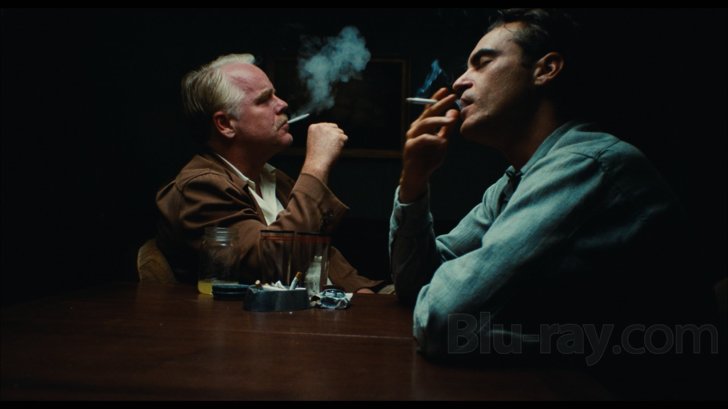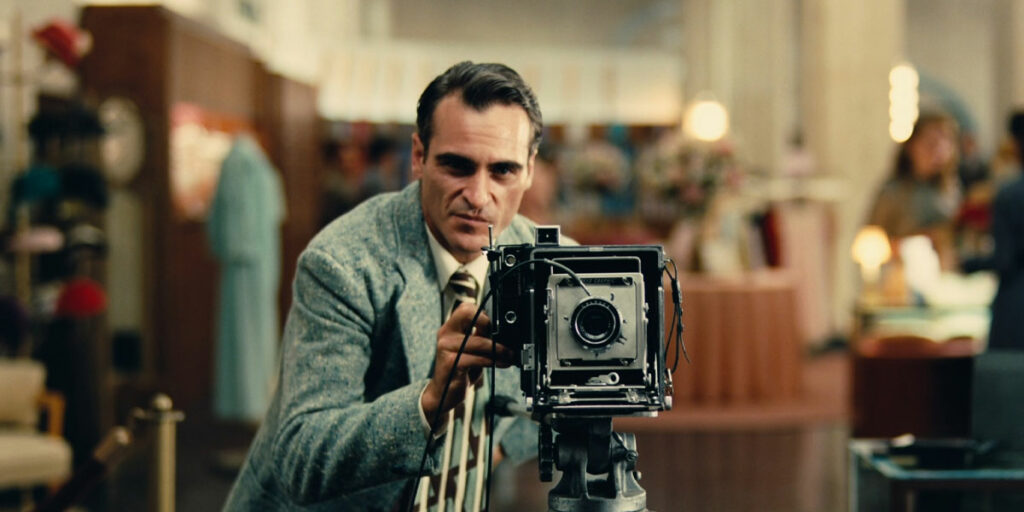10 years later, The Master remains a psychologically gripping tale about humankind’s search for meaning and the different “masters,” good and bad, we serve.
The Master devotes its opening minutes to showcasing the end of World War II, when military men were forced to adjust to a rapidly changing world. Among them is Navy man Freddie Quell (Joaquin Phoenix), a loner, lost, confused, and addicted. He represents the many men and women who felt the same way after witnessing so much death and destruction. The audience witnesses several other confused individuals throughout the film, searching desperately for a purpose, for their own master to serve. Ten years after the film’s release, an audience facing the repercussions of its own world-changing event may find themselves relating to the film even more than they did back in 2012.
The film’s beginning quickly establishes Quell’s master: sexual desire. He makes off-handed jokes to his fellow veterans and names graphic imagery when subjected to a Rorschach test. After working several jobs, he stumbles across a yacht and meets Lancaster Dodd (Philip Seymour Hoffman), the leader of a new experimental religious movement known as The Cause. Dodd immediately takes a liking to Freddie and offers him a sense of purpose. Dodd is wrestling with his own masters, however: status, acceptance, and power. The character, based on famous cult leaders, acts as an authoritative figure to the members of The Cause, and seems to admire the recognition and popularity he has received for his work.
The film constantly and consistently wrestles with the two main characters’ desires. As The Master progresses, Dodd seems determined on fixing Freddie in order to prove something to himself, while Freddie continues to act as a “silly animal,” further feeding his sexual hunger. Both men do show brief glimpses of humanity, like in the Processing scene, when Quell answers a series of personal questions asked by Dodd. The questions, relating to Quell’s love life and dark secrets about his past, clearly strike at Quell’s emotions, while Dodd seems to truly sympathize with the broken man in front of him.
However, the two are often buried by their own mistakes, by the masters they keep clinging to. This is made no clearer than at the midway point of the film. At a house in Philadelphia where members of The Cause are staying, Dodd initiates a song, dancing and belting the lyrics to “I’ll Go No More A-Roving with You Fair Maid.” Dodd struts around the room, no doubt basking in the glory of his own perceived fame. Freddie, meanwhile, imagines all the women in the room are naked. The scene perfectly encapsulates the lack of progression and the inner minds of the two characters.

The Master contains universal truths that are just as relevant 10 years later as they were when it was first released. The film explores the ways people try to provide meaning to their lives and highlights the people in positions of power who try to exploit those who are simply searching for something of value. Dodd resembles not only a cult leader, but a political figure fighting to win the approval of others while serving only his own desire. The film shows Dodd trying to maintain his façade but growing more tired and impatient when his methods and ideas are questioned. This is evident in the exchange between Dodd and a partygoer in New York City, where Dodd crudely insults the man’s science-based critique of Dodd’s metaphysical pontifications and later when Laura Dern’s Helen pushes back on the content of Dodd’s latest book.
The film also highlights the danger of apathy, with Quell unable to break the bonds of his own oppressive master, losing the only woman (Madisen Beaty’s Doris) he ever loved in the process. The film’s final scenes, where Quell seduces a woman at the bar only to find himself curled up next to a sand sculpture of a nude woman, does not bring a sense of resolution, but melancholy and pessimism.
Audiences in 2022 may be even more apt to accept these ideas of purpose and belonging in the wake of the COVID-19 pandemic. After two years of sickness, pain, and death, many may feel just like Freddie, alone and clinging to masters who will ultimately destroy them. Parallels can be drawn between the heated exchanges littered throughout the film and the way modern society quarrels online, where substantive arguments are brushed aside for petty insults. In an era where those in power continue to belittle those beneath them while simultaneously attempting to reach them, those simply trying to get by may see themselves as the Freddie, putting their faith in the suave but just-as-flawed Dodd. People are wandering after a time of terrible turmoil, and society’s masters are proving daily to be inadequate at best and malevolent at worst.
Jesus Christ said, “man cannot serve two masters.” Bob Dylan said we’re all going to serve something, whether it be “the devil” or “the Lord.” In the closing moments of The Master, Dodd tells Freddie: “If you figure a way to live without serving a master, any master, then let the rest of us know, will you? For you’d be the first person in the history of the world.” No matter the circumstances – war, plague, or some other catastrophic occurrence – The Master states that finding the right master to serve is of paramount importance. Though Paul Thomas Anderson does not spell out what master can give humanity the purpose they desire, his film reveals the on-going universal fight to find it.
The Master is available now on Digital, Blu-ray Disc and DVD. Read our list of all of Paul Thomas Anderson ’s films ranked from worst to best.

